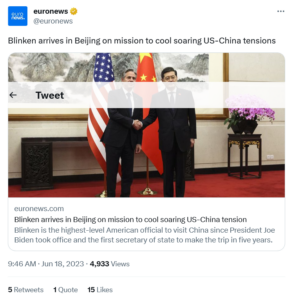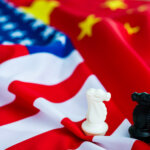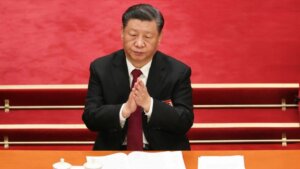Businesses are leaving China for US expansion

|
Getting your Trinity Audio player ready...
|
• US-China tension is forcing Chinese businesses to move.
• American bias causing companies to “de-China” identities.
• Political ideologies may increase the pull of US markets.
Conducting business in the US as a Chinese-native company has grown increasingly difficult since 2019. Escalating US-China trade tensions have led some companies to set up overseas to avoid attention from the US government.
Donald Trump’s (first) term as President of the USA added fuel to the fire, but under Joe Biden’s administration, friction has continued as the US and China battle for global tech pre-eminence.
Flashpoints include the chip war that the countries are locked in, as well as security concerns that have seen TikTok banned on US government devices, and banned altogether in Montana. China also recently blocked key industries from using Micron Technology products and has sought to reign in foreign consultancies and due diligence firms.
Now, the situation has worsened, to the extent that some mainland China tech business owners are considering permanent residency or citizenship abroad, to avoid the biases against and curbs on Chinese companies in America.
The Japan Times heard from Ryan, who didn’t give his family name due to fear of reprisals. His three-year-old software startup is at a point where it would be natural to expand into the US; his software, which has a million users in East Asia, is ready to take on the world’s biggest economy.
However, the US-China trade issues make expansion to the US an unlikely prospect. Since sanctions were imposed on Huawei in 2019, restrictions have been placed on a growing number of Chinese companies by US lawmakers.
“It’s very unfair,” he said, lamenting that competitors from other countries did not face similar issues when trying to expand into the United States. “We feel a lot like the filling sandwiched in the middle of a biscuit.”
Ryan has been based in Shenzhen but is trying to gain permanent residency in another Asian country, where he might avoid bias from the US. Reuters spoke to seven tech entrepreneurs from mainland China who want to expand business operations into the United States.
All of them are seeking permanent residency or citizenship elsewhere, most of them exploring options like Hong Kong, Canada, Japan, the US itself, and Singapore.
Of those seven, only three agreed to be identified, and even then, only by their English first names. They, and the others who chose to be completely anonymous, cited concerns about repercussions within China.
According to the entrepreneurs that spoke to Reuters, geopolitical tensions have meant an unfriendly atmosphere for mainland Chinese companies wanting to operate or gain funding in the United States.

Secretary of State Blinken arrives in Beijing amid US-China tension.
“The political narrative in Washington DC and in many state capitals is based on the misconception that all Chinese companies are intertwined with and taking direction from the Chinese government and the Chinese Communist Party,” says James McGregor, chairman for Greater China at U.S. communications consultancy APCO Worldwide.
In a statement, China’s foreign ministry said that some Western countries want to “politicize technology, putting up obstacles to regular technology and trade cooperation, which benefits neither side, and adversely affects global technological advancement and economic growth.”
YOU MIGHT LIKE

US investments in China under further government threat?
Despite the added difficulty, the end goal for many Chinese businesses is expansion to the US; despite the size of the Chinese market, being a domestic-only company is unappealing.

Xi Jinping’s unprecedented third term leaves some feeling disillusioned. Source: Getty Images.
According to another entrepreneur, Wilson, “everything changed during the pandemic.” He began looking for ways to move his software startup abroad after Xi Jinping won a third term last year.
The crackdown on China’s technology sector overlapped with draconian “zero-Covid” curbs and many are disillusioned by China under Xi.
Distrust between Washington and Beijing is such that it’s easier for employees and shareholders if Wilson is “out.”
US China tension: entrepreneurs choose America
There’s an emerging trend of firms looking to move their base offshore and even “de-China” their companies’ identity. For example, fast-fashion retailer Shein has made a Singapore firm its de facto holding company, and in early May, ecommerce firm PDD Holdings moved its headquarters from Shanghai to Dublin.
Entrepreneurs are unconvinced by Beijing’s claims to support private business owners and were worried about the loss of civic freedoms. Tommy, who also spoke to Reuters, has left China, dispirited by frequent and intrusive government censorship requests that ultimately forced him to shut down the business.
There’s also the fact that ambition in China entails cultivating ties with the Chinese Communist Party, something that private business owners struggle to be excited about.
For entrepreneurs who dream of expansion, that classic neoliberal American dream is far more appealing – a fact that may lead to more and more companies trying to “de-China” their brands in order to lock in to the American market.










